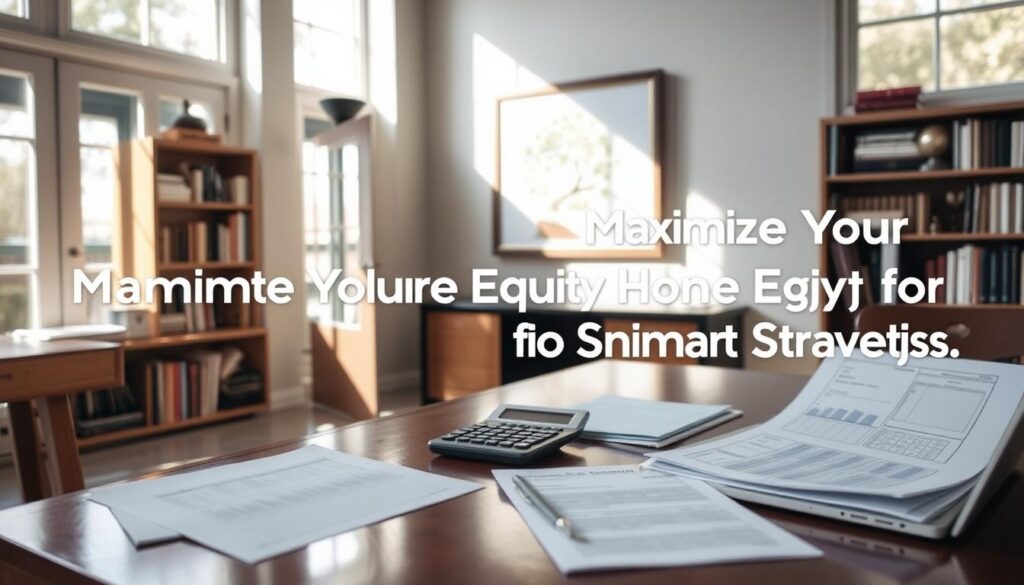Did you know that nearly 27% of U.S. homeowners hold over $100,000 in untapped home equity? That’s like having a hidden savings account tied to your property—one that smart strategies could turn into a powerful tool for financial growth.
Your home equity—the difference between your home’s value and what you owe on it—is more than just a number on a mortgage statement. For millions of Americans, it’s a gateway to opportunities like debt consolidation, investments, or even retirement funds. Yet many overlook its potential until it’s too late.
From strategic renovations to refinancing options, experts at Community Bank and CoreLogic reveal that proactive steps can supercharge your equity’s growth. Even small improvements, like upgrading a kitchen or bathroom, can add thousands to your home’s value, per Bankrate’s latest reports. With smart strategies, you can turn your biggest expense into a financial engine.
This guide breaks down actionable steps to unlock your home’s full potential. Discover how accelerating mortgage payments, choosing high-ROI upgrades, or tapping into home equity loans can align with your financial goals. Ready to turn your house into a smarter investment? Let’s dive in.
Understanding Home Equity
Building wealth starts with understanding home equity basics. Your home’s equity is the portion of your property you truly own. It grows as you pay off your mortgage or when your home’s value increases. Let’s break down how this works.
What Is Home Equity?
At its core, home equity is simple: it’s the difference between your home’s current market value and what you still owe on your mortgage. For example, if your home is worth $300,000 and your loan balance is $150,000, you own $150,000 in equity. This equity becomes a key part of your financial future planning.
Factors Affecting Your Home’s Equity
- Market trends: Rising housing prices boost equity, while downturns can reduce it.
- Payments: Each mortgage payment chips away at your loan, increasing your ownership share.
- Improvements: Upgrades like a new kitchen or bathroom can add value, enhancing property equity factors.
Why Home Equity Matters for Your Financial Future
Equity isn’t just a number on a balance sheet—it’s a tool. You can borrow against it for education, emergencies, or other investments. Smart financial future planning often involves growing equity through strategic decisions like timely repairs or smart refinancing. Protecting and nurturing this asset ensures stability today and opportunities tomorrow.
Preparing Your Financial Foundation
Building a strong financial foundation is key to unlocking home equity’s potential. Start with budgeting basics: track income, expenses, and savings. This clarity shows how much you can reinvest without overspending.
Effective equity planning begins with evaluating your current finances. List all assets, debts, and income streams. Tools like budgeting apps or spreadsheets help organize data. Aim to save 20% of income for emergencies and home investments.
Follow these steps to strengthen your financial base:
- Create a monthly budget that prioritizes savings
- Reduce high-interest debt to lower financial stress
- Consult a financial advisor to align goals with equity strategies
Smart budgeting basics ensure you’re ready to act when opportunities arise. Regularly review your progress and adjust plans as life changes. A solid financial foundation turns home equity into a powerful wealth-building tool.
Evaluating Your Current Home Equity
To unlock your home’s financial potential, start by evaluating your equity through three key steps. First, a market value assessment reveals how much your home is worth today. Next, use simple math for equity calculation to see your current stake. Finally, spot equity growth opportunities to boost long-term gains.
Assessing Your Home’s Market Value
Begin with a professional appraisal or use free online tools like Zillow’s Zestimate or Redfin’s Home Value Estimate. Compare recent sales of similar homes in your area. For precise results, consult local real estate agents who know neighborhood trends. Market value assessments also highlight how upgrades or repairs could raise your home’s worth.
Calculating Your Existing Equity
Equity calculation is straightforward: subtract your remaining mortgage balance from your home’s current market value. For example, if your home appraises at $400,000 and you owe $250,000, your equity is $150,000. Use Community Bank’s equity calculator or spreadsheets to track this over time. Regular checks help spot growth trends.
Identifying Equity Growth Opportunities
Boost equity by targeting areas with the highest impact. Consider these strategies:
- Renovate kitchens or bathrooms—top upgrades that increase resale value
- Track neighborhood development like new schools or transit lines
- Stay updated on local housing trends via real estate platforms
Regular equity growth opportunities audits ensure you act on rising markets or undervalued assets. Small improvements today can amplify returns years later.
Home Equity Investment Strategies for Long-Term Financial Growth
Transforming home equity into a source of long-term growth starts with smart investment strategies. Whether you’re looking to boost your property’s value or fund future goals, these methods turn your home into a flexible financial tool.
- Use home equity loans or HELOCs: Borrow against your equity at low rates to fund education, business ventures, or other wealth-building opportunities. Compare terms and interest rates to align with your financial plan.
- Focus on strategic renovations: Target high-return upgrades like modern kitchens or energy-efficient systems. Bankrate highlights that such projects often recover 70%+ of costs at resale, enhancing long-term growth potential.
- Accelerate mortgage payoff: Extra payments reduce principal faster, building equity naturally. This approach avoids debt risks while strengthening your net worth over time.
Experts recommend pairing these steps with a clear home equity investment timeline. For instance, reinvesting savings from lower mortgage interest into taxable accounts can compound wealth. Consider consulting a financial advisor to balance risk and reward.
Remember: consistency and patience matter most. Small, steady actions today create a stronger foundation for the future.
Smart Renovation Tips to Boost Home Value
Smart home renovations can turn your house into a valuable asset. Prioritizing ROI upgrades ensures your investment pays off when it’s time to sell. Let’s break down which projects add the most value without overspending.
Popular Renovation Projects That Pay Off
Kitchen and bathroom updates consistently rank high in resale value. Installing quartz countertops or modern vanities often recoups over 70% of costs, per recent market trends. Adding a deck or upgrading outdoor lighting also attracts buyers. Stick to neutral color schemes and timeless designs to appeal to broad markets.
Budget-Friendly Home Improvement Hacks
- Paint rooms in soft, neutral tones to widen appeal
- Replace outdated hardware with sleek, contemporary fixtures
- Boost curb appeal with new door hardware or window trim
Small upgrades like these can cost under $5,000 but add thousands to your home’s value. Budget-friendly home improvement projects like these keep your investment smart and strategic.
Maximizing Value Through Smart Choices
Energy-efficient upgrades like ENERGY STAR windows or solar panel installations increase both comfort and equity. Smart tech like Nest thermostats or Ring doorbells also add modern appeal. Focus on projects that align with buyer preferences in your area to ensure strong returns.
Leveraging Your Home Equity for Investment Opportunities
Unlocking leveraging equity can turn your home into a powerful financial tool. Investment opportunities arise when you tap into your home’s value through products like HELOC options or home equity loans. These options let you reinvest in growth areas like rental properties, businesses, or even high-return stocks.

Data shows HELOC options offer flexibility. As of mid-2022, HELOCs averaged 7.3% interest, competitive with home equity loans at 7.29%. Compare these rates to potential returns: the stock market’s 7–14% average annual return makes smart investment opportunities worth exploring. For example, a garage door replacement recoups 93.3% of its cost, while a minor kitchen remodel nets 71.2% back. A detached ADU, costing $100k–$150k, can boost your home’s value by up to $158k, proving equity’s power.
| Project | Recoup Value |
|---|---|
| Garage Door Replacement | 93.3% |
| Manufactured Stone Veneer | 91.4% |
| Minor Kitchen Remodel | 71.2% |
| ADU (Cost) | $100,000–$150,000 |
| ADU Value Increase | $158,000 |
Before acting, evaluate leveraging equity risks. Borrow strategically to align with your financial goals. Smart choices today can turn home equity into long-term wealth.
Financial Planning and Budgeting for Home Investments
Effective financial planning starts with a clear home investment budget. This roadmap ensures every dollar spent on your property aligns with your realistic financial goals. Begin by mapping out income, expenses, and potential returns to avoid overspending.
Creating a Home Investment Budget
Follow these steps to build a budget tailored to your needs:
- Track monthly cash flow to identify available funds for investments.
- Rank projects by urgency and potential value increase (e.g., kitchen upgrades often yield 80% ROI).
- Reserve 10-15% of your budget for unexpected costs.
Setting Realistic Financial Goals
Balance ambition with practicality using these tips:
- Set short-term milestones (e.g., saving $5,000 in 6 months).
- Align goals with market trends—check Zillow or Redfin for local price forecasts.
- Reassess goals quarterly to stay on track.
Utilizing Expert Financial Advice
Consult professionals to refine your strategy:
| Advisor Type | Role | Benefit |
|---|---|---|
| Financial Planner | Customizes financial planning frameworks | Ensures goals match lifestyle and risks |
| Home Appraiser | Assesses property value accurately | Avoids over-budget decisions |
| Tax Advisor | Identifies deductible expenses | Reduces costs through legal loopholes |
Combining these steps turns aspirations into actionable plans. Remember: even small adjustments to your home investment budget can amplify equity growth over time.
Navigating Home Equity Loans and Refinancing
Choosing the right home equity loans or refinancing options can unlock cash without selling your home. Start by comparing fixed-rate home equity loans, which offer lump-sum payments, with HELOCs that provide revolving credit lines. Both let you borrow against your home’s value but work differently.
- Home Equity Loans: Set monthly payments, predictable terms.
- HELOCs: Flexible access up to a limit, ideal for projects like renovations.
Consider refinancing options if current mortgage rates are lower than yours. For instance, Bank of America’s streamline refinancing cuts costs for FHA loan holders. Smart mortgage strategies might involve combining loans or shortening terms to save interest.
Example: A homeowner with $50k equity could take a $30k HELOC at 5% APR to upgrade their kitchen. Check terms from lenders like Chase or US Bank to compare rates and fees. Always compare closing costs and repayment timelines.
Before deciding, review your budget. Use mortgage strategies like biweekly payments to pay off debt faster. Avoid overborrowing—keep 15-20% equity as a safety net. Consult a certified financial planner to align choices with long-term goals.
Tax Considerations and Benefits for Home Equity Growth
Navigating tax rules can unlock hidden savings in your equity strategy. Smart choices now help you keep more of your gains. Here’s how tax benefits and deductions shape your plans.
Understanding Tax Deductions
Some home improvements qualify for equity tax deductions. For instance, mortgage interest and property taxes tied to home upgrades may reduce your taxable income. Check IRS guidelines to confirm eligibility for write-offs like energy-efficient upgrades or structural repairs.
Benefits of Home Equity Loans on Taxes
Using a home equity loan? Interest might qualify as a deduction if funds pay for home improvements. The IRS allows deductions for loans used to buy, build, or improve your main home. Consult Publication 530 for current rules on how loan purposes affect tax breaks.
Planning for Future Tax Changes
Stay ahead of future tax planning by tracking legislative shifts. Tax laws change yearly—like 2017’s cap on state and local tax deductions. Build flexibility into your strategy. Consider these steps:
- Review IRS updates twice a year
- Keep receipts for all home-related expenses
- Discuss future scenarios with a CPA to adjust equity goals
Proactive steps today protect your equity growth against unpredictable tax shifts. Combine deductions with long-term tax planning to maximize savings.
Long-Term Strategies to Increase Home Value
Building lasting wealth through your home requires more than quick fixes. Let’s explore proven methods to grow equity over years, using insights from experts like CoreLogic and Bankrate.
Analyzing Long-Term Market Trends
Track long-term market trends to spot opportunities. Check local housing demand, job growth, and infrastructure projects. For example, areas near expanding tech hubs often see steady value increases. Tools like Zillow and Redfin offer free market reports to guide your decisions.
Inflation’s Impact on Home Value
Inflation can work for you—if you plan ahead. Rising prices usually lift property values, but stagnant homes risk falling behind. Upgrade kitchens or bathrooms to keep pace with inflation impact. Bankrate reports that modern kitchens add 80% ROI in inflation-driven markets.
Diversifying Your Investment Portfolio
Don’t put all your funds into home improvements. Mix diversified investments like rental properties or stocks to balance risks. For instance, invest in energy-efficient upgrades while also saving in index funds. This spreads risk and builds multiple income streams.
Regularly review your strategy. Adjust plans every 3-5 years based on economic shifts. Combining smart home upgrades with broader financial moves creates a resilient path to long-term growth.
Real-Life Success Stories and Lessons Learned
Discover how others have turned home equity into financial wins through success stories and real-life examples. Let’s explore proven paths to growth.
Consider the Smith family in Texas, who boosted their equity by 30% after upgrading their kitchen. They focused on modern, neutral designs that appealed to buyers. Their real-life examples show that strategic upgrades pay off. Another homeowner in Colorado refinanced their mortgage, cutting interest rates and freeing funds for investments. Both stories highlight the power of timing and research.
- Always prioritize high-demand upgrades like kitchens and bathrooms.
- Consult professionals to avoid costly mistakes.
- Plan for long-term trends, not quick fixes.
These success stories prove that patience and smart choices build equity. Learn from their challenges, like unexpected renovation costs or market dips, to avoid pitfalls. Whether you’re renovating or reinvesting, their experiences offer actionable insights.
Take inspiration from these real-life examples to craft your own strategy. Remember, every decision starts with understanding your equity’s potential—and the proven steps others have taken to grow theirs.
Conclusion
In this conclusion, remember that your home equity isn’t just a number—it’s a tool for financial strategy wrap-up. The strategies outlined, from smart renovations to tax-savvy planning, offer pathways to grow wealth over time. Final thoughts highlight the importance of balancing short-term upgrades like kitchen remodels with long-term goals like retirement planning.
Take stock of your home’s market value regularly, as discussed in earlier sections. Whether refinancing with a loan from institutions like Fannie Mae or budgeting for curb appeal improvements, every choice impacts equity. Tax deductions from the IRS, like those for mortgage interest, also play a role in boosting returns.
Final thoughts emphasize acting now. Review your financial goals annually and consult experts like certified financial planners. A well-planned approach turns your home into an asset that works for you. By following these steps, you build a foundation for stability and growth. Your financial strategy wrap-up isn’t final—it evolves with market trends and personal needs. Start small, stay informed, and watch your equity grow.



